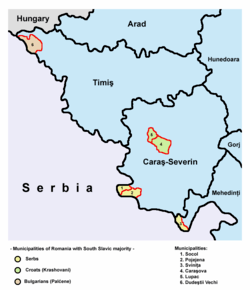Dudeștii Vechi
| Dudeștii Vechi Stár Bišnov | ||
|---|---|---|
| Commune | ||
|
Banat Bulgarian Roman Catholic church in Dudeștii Vechi (Stár Bišnov) | ||
| ||
 Location of Dudeștii Vechi | ||
 Dudeștii Vechi Location of Dudeștii Vechi | ||
| Coordinates: 46°03′N 20°29′E / 46.050°N 20.483°ECoordinates: 46°03′N 20°29′E / 46.050°N 20.483°E | ||
| Country |
| |
| County |
| |
| Status | Commune | |
| Government | ||
| • Mayor | Bono Cucalan (PNL) | |
| Area | ||
| • Total | 95.64 km2 (36.93 sq mi) | |
| Population (2011) | ||
| • Total | 4,203 | |
| Time zone | EET (UTC+2) | |
| • Summer (DST) | EEST (UTC+3) | |
| Website | http://www.e-primarii.ro/~dudestiivechi/index.php | |
Dudeștii Vechi (Bulgarian: Стар Бешенов / Star Beshenov; Banat Bulgarian: Stár Bišnov) is a commune in Timiș County, Romania. Dudeștii Vechi is mostly populated by Banat Bulgarians (Palćene), a regional minority group of ethnic Bulgarians that profess Roman Catholicism, who came from northern Bulgaria, and who are descendants of Paulicians that settled in the area around 1738. At the 2011 census, the total population of the commune numbered 4203 people.
Name
Until 1968, it was known as Beșenova Veche. In Bulgarian, it is known as Стар Бешенов / Star Beshenov, in Banat Bulgarian as Stár Bišnov, in German as Altbeschenowa, in Hungarian as Óbesenyő, and in Serbian as Старо Бешеново / Staro Bešenovo.
Languages
The commune is officially bilingual, with both Romanian and Bulgarian being used as working languages on public signage and in administration, education and justice.
Religion
The majority of the inhabitants are Roman Catholic.
Villages
The commune is composed of three villages: Cheglevici (Banat Bulgarian: Téglivič, German: Keglewitschhausen, Hungarian: Keglevichháza, Serbian: Кеглевић), Colonia Bulgară and Dudeștii Vechi. It also included Vălcani village until 2005, when it was split off to form a separate commune.
Colonia Bulgară (Banat Bulgarian: Telepa, German: Bulgarische Kolonie, Hungarian: Bolgartelep) was founded as Telepa by Roman Catholic Banat Bulgarian colonists in 1846. In 1910, it had a population of 714 Bulgarians. In 1930, the population was 830, of which 353 Bulgarians, 338 Hungarians, 123 Germans, 13 Romanians and 3 Romani. In the 1940 census, the Bulgarians were not recognized as a separate ethnic group by Ion Antonescu's regime, and the population was 729, of which 314 "others", 295 Hungarians, 107 Germans and 13 Romanians.
Culture
The school in Dudeștii Vechi was founded in 1745 by the Bulgarian settlers with the help of the Roman Catholic Church. It is the oldest school of the Bulgarian diaspora and the only school in Romania where Bulgarian language is taught to all grades. As of 2004, education in Bulgarian was optional, but efforts were made to transform the school into a bilingual one.
The village also has an imposing Roman Catholic church.
Population

According to the 2011 Romanian census, the commune had a population of 4203. Of the inhabitants for whom data were available, 61.1% were Banat Bulgarians, 28.1% Romanians, 5.6% Roma, 4% Hungarians and 0.7% Germans.
Historical population
Table
| Census | Ethnic distribution | ||||||||||
|---|---|---|---|---|---|---|---|---|---|---|---|
| Year | Population | Romanians | Banat Bulgarians | Germans | Magyars | Romani | Serbs | Jews | Slovaks | Other | Unknown |
| 1880 | 11,690 | 2,754 | n.d | 1,295 | 1,101 | n.d | n.d | n.d | n.d | 6,366 | |
| 1910 | 12,638 | 3,121 | n.d | 1,403 | 2,152 | n.d | n.d | n.d | n.d | 5,962 | |
| 1941 | 11,334 | 2,661 | n.d | 1,206 | 1,187 | n.d | n.d | n.d | n.d | 6,280 | |
| 1948 | 11,620 | 2,754 | 5,771 | 1,327 | 1,415 | 232 | 53 | 34 | 20 | ||
| 1956 | 9,653 | 2,340 | 5,610 | 478 | 995 | 210 | 6 | 5 | 7 | ||
| 1977 | 8,030 | 2,221 | 4,669 | 319 | 694 | 109 | 6 | 2 | 5 | 9 | |
| 1992 | 6,409 | 1,996 | 3,633 | 57 | 379 | 305 | 11 | 1 | 9 | 17 | |
| 2002 | 5,807 | 2,368 | 2,987 | 44 | 330 | 62 | 16 | ||||
| 2011 | 4,203 | 1,122 | 2,439 | 27 | 159 | 222 | 6 | 0 | 6 | 10 | 212 |
Chart and Table
| Population trend (Growth/Downtrend) | ||||||||
|---|---|---|---|---|---|---|---|---|
 | ||||||||
See also
References
External links
| Wikimedia Commons has media related to Dudeștii Vechi. |
- 2002 census data
- Dudeștii Vechi, city hall website of Dudeștii Vechi
- Star Bisnov, Dudeștii Vechi website

